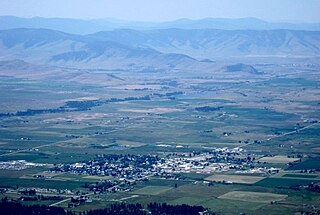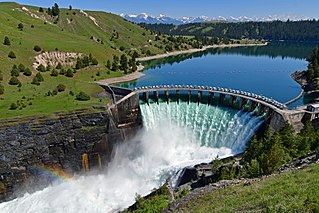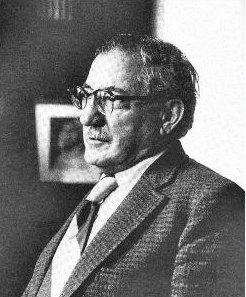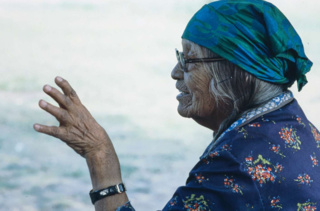Related Research Articles

Arlee is an unincorporated community and census-designated place (CDP) on the Flathead Reservation, Lake County, Montana, United States. The population was 725 at the 2020 census. It is named after Alee, a Salish chief. The chief's name has no "r", as the Salish alphabet has no letter "r".

Pablo is a census-designated place (CDP) in Lake County, Montana, United States. The population was 2,138 at the 2020 census. It is the home of Salish Kootenai College and the seat of government of the Flathead Indian Reservation.

Ronan is a city in Lake County, Montana, United States. It is on the Flathead Indian Reservation. The population was 1,955 at the 2020 census.

The Flathead Indian Reservation, located in western Montana on the Flathead River, is home to the Bitterroot Salish, Kootenai, and Pend d'Oreilles tribes – also known as the Confederated Salish and Kootenai Tribes of the Flathead Nation. The reservation, often referred to as the Flathead Nation, or simply Flathead or by its official acronym C.S.K.T., was created through the July 16, 1855, Treaty of Hellgate.

The Confederated Salish and Kootenai Tribes of the Flathead Reservation are a federally recognized tribe in the U.S. state of Montana. The government includes members of several Bitterroot Salish, Kootenai and Pend d'Oreilles tribes and is centered on the Flathead Indian Reservation.

The Seli’š Ksanka Qlispe’ Dam, also known as SKQ Dam, is a concrete gravity-arch dam located at river mile 72 of the Flathead River. Built in 1938, it raises the level and increases the size of Flathead Lake near Polson, Montana. The dam was designed to generate hydroelectricity but also serves recreational and irrigation uses.
Native American studies is an interdisciplinary academic field that examines the history, culture, politics, issues, spirituality, sociology and contemporary experience of Native peoples in North America, or, taking a hemispheric approach, the Americas. Increasingly, debate has focused on the differences rather than the similarities between other ethnic studies disciplines such as African American studies, Asian American studies, and Latino/a studies.

Salish Kootenai College (SKC) is a private tribal land-grant community college in Pablo, Montana. It serves the Bitterroot Salish, Kootenai, and Pend d'Oreilles tribes. SKC's main campus is on the Flathead Reservation. There are three satellite locations in eastern Washington state, in Colville, Spokane, and Wellpinit. Approximately 1,207 students attend SKC. Although enrollment is not limited to Native American students, SKC's primary function is to serve the needs of Native American people.

The CSKT Bison Range (BR) is a nature reserve on the Flathead Indian Reservation in western Montana established for the conservation of American bison. Formerly called the National Bison Range, the size of the bison herd at the BR is 350 adult bison and welcomes between 50-60 calves per year. Established as a National Wildlife Refuge in 1908, the BR consists of approximately 18,524 acres (7,496 ha) within the Montana valley and foothill grasslands. Management of the site was transferred back to the Confederated Salish and Kootenai Tribes in 2022 from the U.S. Fish and Wildlife Service after more than a century of federal management and nearly two decades of negotiations.

The Treaty of Hellgate was a treaty agreement between the United States and the Bitterroot Salish, Upper Pend d'Oreille, and Lower Kutenai tribes. The treaty was signed at Hellgate on 16 July 1855. Signatories included Isaac Stevens, superintendent of Indian affairs and governor of Washington Territory; Victor, chief of the Bitterroot Salish; Alexander, chief of the Pend d'Oreilles; Michelle, chief of the Kutenais; and several subchiefs. The treaty was ratified by Congress, signed by President James Buchanan, and proclaimed on 18 April 1859. It established the Flathead Indian Reservation.

William D'Arcy McNickle was a writer, Native American activist, college professor and administrator, and anthropologist. Of Irish and Cree-Métis descent, he later enrolled in the Salish Kootenai nation, as his mother had come to Montana with the Métis as a refugee. He is known also for his novel The Surrounded.

The Salish or Séliš language, also known as Kalispel–Pend d'oreille, Kalispel–Spokane–Flathead, or Montana Salish to distinguish it from other Salishan languages, is a Salishan language spoken by about 64 elders of the Flathead Nation in north central Montana and of the Kalispel Indian Reservation in northeastern Washington state, and by another 50 elders of the Spokane Indian Reservation of Washington. As of 2012, Salish is "critically endangered" in Montana and Idaho according to UNESCO.
Janine Pease is an American educator and Native American advocate. She is the founding president of the Little Big Horn College as well as the past president of the American Indian Higher Education Consortium and director of the American Indian College Fund. She was appointed by President Bill Clinton to the National Advisory Council on Indian Education and the White House Initiative on Tribal Colleges and Universities Advisory Council. She has also served as a trustee of the Smithsonian National Museum of the American Indian.
Debra Cecille Magpie Earling is a Native American novelist, and short story writer. She is a member of the Bitterroot Salish (tribe). She is the author of Perma Red and The Lost Journals of Sacajewea, which was on display at the Missoula Museum of Art in late 2011. Her work has also appeared in Ploughshares, the Northeast Indian Quarterly, and many anthologies.
Corwin "Corky" Clairmont is a printmaker and conceptual and installation artist from the Confederated Salish and Kootenai Tribes of the Flathead Nation. Known for his high concept and politically charged works, Clairmont seeks to explore situations that affect Indian Country historically and in contemporary times.
I don't put work out that gives solutions but provokes questions. - Corky Clairmont
Gen Huit is a Salish-Pend Oreille singer-songwriter from Saint Paul, Minnesota, who is known for her presentations on Native American life and culture at Glacier National Park and for singing about justice for Native American peoples.
Marjorie Bear Don't Walk is an Ojibwa-Salish health care professional and Native American fashion designer. She is most known as an advocate for reforms in the Indian Health Service, and specifically the care of urban Native Americans. In addition, she is a fashion designer who has targeted career women, designing professional attire which incorporated traditional techniques into her clothing.
Henrietta Mann is a Native American academic and activist. She was one of the designers of the University of California, Berkeley, the University of Montana and Haskell Indian Nations University's Native American studies programs. In 2000 she became the first American Indian to hold the endowed chair of Native American studies at Montana State University and was honored with the Montana Governor's Humanities Award. She retired in 2004 and became a special advisor to the president of Montana State University.

Mary "Agnes" Vanderburg (1901–1989) was a Native American teacher, translator and author. She was descended from Selish Indians on the Flathead Reservation in the US state of Montana.
References
- ↑ "The Montanan - The Magazine of the University of Montana". Fall 2003. Retrieved 2010-03-02.
- ↑ Missoulian, VINCE DEVLIN of the. "Salish Kootenai College welcomes new leader Luana Ross". missoulian.com. Retrieved 2017-11-18.
- ↑ "Luana Ross | American Indian Studies | University of Washington". ais.washington.edu. Retrieved 2017-03-04.
- ↑ "Tribal college picks prof to be president". 18 January 2010. Retrieved 2010-03-02.
- ↑ "Char-Koosta News - Luana Ross resigns as Salish Kootenai College President". www.charkoosta.com. Retrieved 2017-03-04.
- ↑ Ross, Luana (1998). Inventing the savage the social construction of Native American criminality. Austin: University of Texas Press. ISBN 9780292755901. OCLC 605404397.
- ↑ "University of Texas Press: Inventing the Savage".
- ↑ "American Political Science Association > MEMBERSHIP > Organized Sections by Title > Organized Section 33: Best Book Award". www.apsanet.org. Retrieved 2017-03-04.
- ↑ "Luana Ross | American Indian Studies | University of Washington". ais.washington.edu. Retrieved 2017-11-18.
- ↑ "Luana Ross | American Indian Studies | University of Washington". ais.washington.edu. Retrieved 2017-11-18.
- ↑ "Luana Ross | American Indian Studies | University of Washington". ais.washington.edu. Retrieved 2017-11-18.
- ↑ "Native Voices - Indigenous Documentary Film at the University of Washington". www.com.washington.edu. Retrieved 2017-03-04.
- ↑ "Native Voices | American Indian Studies | University of Washington". ais.washington.edu. Retrieved 2017-11-18.
- ↑ "Luana Ross | American Indian Studies | University of Washington". ais.washington.edu. Retrieved 2017-03-04.
- ↑ Missoulian, VINCE DEVLIN of the. "Salish Kootenai College welcomes new leader Luana Ross". missoulian.com. Retrieved 2017-11-18.
- ↑ "Salish Kootenai College Celebrates Graduation and Luana Ross's First Year as President - Indian Country Media Network". indiancountrymedianetwork.com. Retrieved 2017-11-18.
- ↑ "Char-Koosta News - Luana Ross resigns as Salish Kootenai College President". www.charkoosta.com. Retrieved 2017-11-18.
- ↑ "Char-Koosta News - Luana Ross resigns as Salish Kootenai College President". www.charkoosta.com. Retrieved 2017-11-18.
- ↑ "American Indian Culture and Research Journal: Vol. 40, No. 1". www.books.aisc.ucla.edu. Retrieved 2017-03-04.
- ↑ "Masthead". Signs: Journal of Women in Culture and Society. 2012-08-22. Retrieved 2017-08-22.